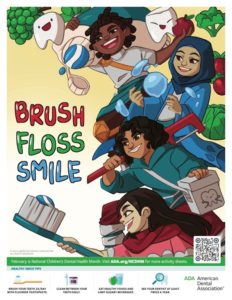
The children are indeed the future. Promoting healthy habits for our children is one of the most important things we can do for them. February marks National Children’s Dental Health Month sponsored by the American Dental Association (ADA). One of the main focuses of this national observance is prevention of dental issues by practicing good oral health.
Tooth decay is one of the most common health problems facing children, but luckily it is largely preventable. According to the American Academy of Pediatric Dentistry (AAPD), cavities are 4X’s more prevalent than childhood asthma and 3X’s greater than childhood obesity. We are all encouraged to spread the word about the benefits of good oral health. Dental problems can lead to missed days at school, oral pain, the need for additional dental treatment, among many other issues.
Many organizations across the nation celebrate by also providing National Children’s Dental Health Month posters, coloring and essay contests, health fairs, free dental screenings and much more. It is important to develop good dental habits as early as possible to keep your teeth healthy and lasting for a lifetime. Ensure that you and your family are scheduled to visit your dentist regularly to help keep you on track with maintaining healthy gums and teeth. It is recommended to establish a dental home for your child by their first birthday. Teach your children how to brush and floss and make it fun so that it is an exciting activity that they look forward to doing daily.
Here are a few tips for maintaining your child’s dental health:
- Begin toothbrushing your infant’s teeth once you see the first sign of a developing tooth. You can use water and small size of fluoride toothpaste (approximately the size of a grain of rice). Be sure to replace toothbrushes approximately every 3-4 months, or sooner if the bristles become worn or frayed.
- Be sure your child is brushing their teeth at least twice a day for two minutes teach time. Children aged 2-6 years old should use a pea-sized amount of fluoride toothpaste and should be supervised by adults when brushing.
- Teach your child how to floss once their teeth begin to contact other teeth. This is important for helping remove food debris and bacterial plaque in-between the teeth that can cause cavities.
- Promote healthy eating habits and shy away from snacking. Avoid foods and beverages high in sugar, such as fruit juices, energy drinks, fruit snacks, candy, and sweets for instance. Instead, opt for providing tooth-friendly foods like calcium-rich cheese, yogurt, nuts, vegetables, and protein.
- Stay hydrated with fluoridated water. Water helps rinse away food particles and the fluoride can help prevent tooth decay and strengthen tooth enamel.
This pandemic has impacted us all, but our community is indeed all stronger together. Our team at WDG always has your safety and health as our top priority, and we have implemented additional safety measures and equipment to help prevent the transmission of all infections, including COVID-19. Wellesley Dental Group has completely reopened since June 8th, 2020 for all dental procedures and cleanings! Thank you for entrusting your health and dental care to us at Wellesley Dental Group.
Feel free to contact Drs. Ali & Ali and the caring team at Wellesley Dental Group if you have any thoughts or concerns; they will be happy to answer your questions! Contact us today at 781-237-9071 or smile@wellesleydentalgroup.com to set up an appointment.
Your little ones and teens are welcome to visit our pediatric dentist, Dr. Bahar Houshman and Dr. Marisa Reason is happy to help with your TMJ and orthodontic needs. For wisdom teeth extractions or any other oral surgery needs, Dr. Reisman would love to help, and our gum-specialist Dr. Singh can help with your gum-related concerns.
References:
https://www.ada.org/resources/community-initiatives/national-childrens-dental-health-month
https://nationaltoday.com/national-childrens-dental-health-month/
